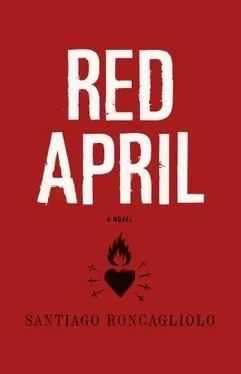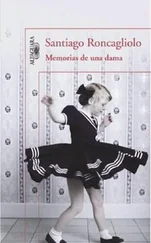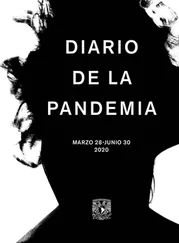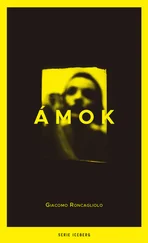“Shit!” said the prosecutor, trying to catch his breath. He had to lean against a wall. The second officer came up a few seconds later.
“They have to be in one of these houses,” said the first policeman. “This is as far as they could have gone.”
They stood there, not knowing what to do, taking in air in great gulps. One of the officers went in a shop for something to drink. The prosecutor felt frustrated and furious. He followed the officer into the shop, where a girl of about fourteen waited on them. The other policeman remained outside. The girl placed two Inca Kolas on the counter. There was nothing else in the shop but Inca Kola and Field saltines. As they were taking the first swallows, the officer stared at the girl. He seemed to hesitate. He looked toward the back room, hidden behind a curtain. Then he shook his head, as if he had been confused. He smiled at the girl:
“Will you give me some crackers too, Mamacita?”
The girl turned her back to take down the crackers. They were on a high shelf. When she raised her arm, the officer took out his pistol, a 9mm like the one the prosecutor had at home, and jumped over the counter. He grabbed the girl around the neck and pressed the barrel to her head. Then, using her as a shield, he pushed her toward the back room, aiming the weapon and shouting:
“Don't any of you move, damn it, or I'll kill her! Damn it, don't move!”
He went into the back room. The prosecutor did not know what to do. Alerted by the shouts, the other officer came in holding his weapon. In the back room, the shouts of the first officer and two other voices could be heard:
“No, Papacito, we haven't done anything, Papa! Leave us alone!”
The officer pointed at the door. There was the sound of blows, breaking glass, objects falling from shelves, the weeping of a woman, that is, a girl.
“Hands on your head, damn it! Back!”
With hands behind their heads, two young men came out of the back room. The prosecutor recognized the white undershirt of one of the boys he had pursued. The officer waiting for them outside, aiming at their faces, became angry when he saw them:
“You two? Motherfucker …”
They put them against the wall, always aiming at their heads, and the prosecutor searched them: he found two clasp knives and a small revolver, a.28. The policemen kicked them a little and had them lie down on the ground, their arms extended, until the patrol wagon came to take them away. They had the girl lie down with them as well.
“You can't be a delinquent in Ayacucho,” said the officer who had recognized the girl. “Everybody knows everybody here.”
One of the detainees sobbed.
“Shut up, damn it!” said the other officer. He kicked him in the stomach. The other boy held back a sob.
“Who are they?” asked Chacaltana.
“Them? Nothing but trash. When Sendero Luminoso was already dying, it lowered the age of its cadres. It began recruiting kids ten or eleven years old, even nine. They gave them weapons and trained them to handle explosives. Then Sendero was finished, but the kids were still wandering around, nothing but common criminals.”
The prosecutor stared at the two boys lying on the ground. One was about eighteen. The other, younger than fifteen.
“And why are they still active?”
“What should we do with them? Until a little while ago they were underage. And there's no reformatory here. But the veterans like this motherfucker,” and he kicked the face of the older one, “have been training kids like this one for years,” and he stepped on the hand of the younger one. The prosecutor heard him sob from the ground. It was like the whimpering of a child. “The age gets lower and lower and they get worse and worse. And there's nothing we can do.”
The prosecutor noticed that the girl had a black eye.
“And what would you do with them?”
The other policeman answered:
“If it was up to me, I'd lock them up and throw away the key. There's no changing them. As the tree grows …”
The older boy turned to look at the policeman with hatred. The officer spat at him and said:
“What are you looking at, damn it? You're all grown up, huh? You must be at least twenty, but you play the snot-nose kid, damn undocumented shit. With your record, we can send you to be fucked in maximum security. So don't look at me too much because I'll turn you into a woman, see?”
The prosecutor understood why he did not know anything about them. There were no complaints at the Ministry of Justice, no papers on these boys. As Commander Carrión had said, they did not even have a name.
He went back to the center of town with his head lowered, preoccupied. As he crossed the residential tract he thought someone was walking behind him. When he turned, there was only a woman with some flowers for the procession.
Later, at police headquarters, the officers informed him that the tourists who had been attacked did not have even minor wounds. Pure fright, they said. The one who had taken their complaint remarked:
“Gringos, Señor Prosecutor, they're all faggots. They scream and carry on and nobody's done anything to them. They weren't even robbed because they all started shouting. We ought to export some criminals to them so they'll know what a real robbery is and stop wasting our time with stupid bullshit.”
Associate District Prosecutor Félix Chacaltana Saldívar spent the rest of the afternoon watching the festivities. He saw the Lord of Palms leave the Monastery of St. Teresa mounted on a white donkey, accompanied by twelve Ayacuchans dressed as apostles, and the principal civilian authorities of the city. After them came another donkey carrying baskets of fruit. When they reached the cathedral, the sculpture of Christ was taken down and brought into the temple to the sound of hurrahs and applause. The prosecutor recognized the carpet of the Heart of Jesus that he had seen at the beginning of the ceremony. After the passage of people and animals, it had been destroyed. The figure of the heart was torn to pieces, shreds of it still hanging from the hooves of the donkeys.
On Monday afternoon, after having lunch with Edith, the Associate District Prosecutor walked to the maximum security prison of Huamanga. His entrance was easier than the last time. Colonel Olazábal welcomed him with open arms and offered him a mate because he knew it was his favorite drink. The prosecutor did not ask how he knew. He imagined the answer: Ayacucho is a small city, everybody knows everything. He assured Olazábal that he had interceded on behalf of his promotion, and then he could see Hernán Durango González, alias Comrade Alonso.
“You're becoming very fond of me, Señor Prosecutor,” was the first thing the terrorist said. “I don't have many visitors who are so faithful.”
“I have come on a professional matter, Señor Durango.”
“Call me Alonso, please.”
“Your name is Hernán.”
On the previous occasion, the terrorist had been aggressive and self-assured. Now, a certain irony seemed to emanate from his eyes, otherwise as fixed and stony as always. Knowing that Durango always had an answer even before knowing the question, the prosecutor decided to move ahead to what he had to say.
“I want to know what connections …”
“Why do you think I'll tell you anything, Señor Prosecutor?”
It was a good question. The prosecutor shuffled through possible responses: because I cannot think of anyone else to talk to, because I have no idea what is going on here, because I am not a policeman and do not know how to investigate, because I have to turn in a report and for the first time do not know how to do it …
“Because you like to talk, Señor Durango,” he finally said. “You feel superior to all of us and you like to flaunt it.”
Читать дальше












